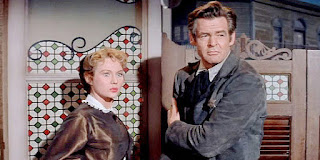Directed by Robert D Webb; produced by Robert L Jacks
The railway has come to a small Kansas town, prompting a boom: cattlemen are driving their herds in for shipping, hotels and saloons are opening, and gambling houses are mushrooming. Marshal Cass Silver (Robert Ryan) is probably alone in disliking the sudden growth. Especially since along with the wave of sudden prosperity comes ‘Honest John’ Barrett, an entrepreneur with a shady past and a history with Silver. Each man wants the other gone, but only Barrett will stoop to murder to have his way.
The Proud Ones is not a particularly distinguished western, despite the good cast. It has some interesting elements. That it takes place at a time of sudden and almost over-night growth in a town is different than in many westerns; it’s more usual to have a town where nothing is seen to change. The change happening here is a catalyst, not just for the plot, but for characters: most of the town is in favour of the increased business, new people and excitement. Even Silver’s girlfriend, Sally (Virginia Mayo), who runs a restaurant, likes it. For the marshal, it just means trouble.
The plot doesn’t take as much advantage of this as it could. It is shunted too strongly toward a semi-revenge story-line: young Thad Anderson (Jeffrey Hunter) thinks Silver killed his father, and just happens to be driving cattle near Silver’s town. His decision to befriend Silver is too abrupt, and even then, he seems to waver between believing Silver’s version of past events and not.
Added to the mix is Silver’s trouble with his eyesight: a blow to the head leaves him with periodic blurry vision.
Any of these elements would have been enough to build a story around. Including all of them leaves each not only incomplete but only half-heartedly contributing to the movie.
The acting is good. It’s enjoyable to see Ryan playing an unmitigated good guy, though he still gives the impression that he is the last man any troublemaker would want to annoy. Hunter does well, though I am beginning to think that he had too many early rôles as a young man with a chip on his shoulder. Mayo is under-used in her part; as well, Walter Brennan and Arthur O’Connell were at points in their careers when they should have had more to do in the film.
The direction is nothing extraordinary. This may have been Webb’s biggest effort in that regard; he alternated work as a director of mediocre films with that of a second unit director on bigger budget movies (eg. The Desert Fox) and even blockbusters (eg. Cleopatra). Despite his experience, and his family’s history in Hollywood, he creates nothing remarkable in The Proud Ones.
A fairly standard western, The Proud Ones has some interesting features that may allow it to be remembered. Nonetheless, I can’t see any viewer wanting to see it a second time.


























